
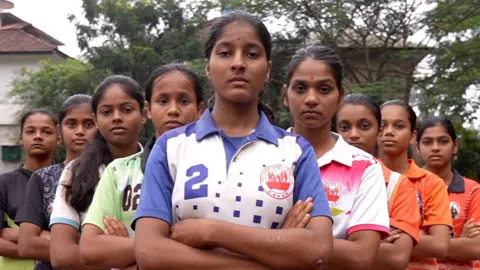 BBC
BBCMina’s eyes walk from left to right and return again, looking for a passing moment when you can move them.
It plays the role of Kabadi, an Indian communication sport now played in more than 50 countries around the world.
Kabaddi is played between two teams, each with seven players. Individuals alternate to climb to the half -stadium of the opposition to distinguish their opponents and return to half without being dealt with on the ground.
But for the 14 -year -old Mina, this is more than winning points. Sport provides an escape from a restricted rural life and opens a world of opportunities.
“It is different when I play,” she says shyly, struggles to find words. “At that moment, I am not Mina who adheres to homework, which is weighed by stress and expectations. It is only I and the opponent … I seem to be more powerful than other girls who do not play.”
Mina lives on the outskirts of a small tribal village, Kudushi, about 230 km from the financial capital of India, Mumbai, where girls’ lives are traditionally revolving around household chores, marriage and children.
But 15 years ago, a group of teachers at the village school decided that they wanted to give girls more opportunities.

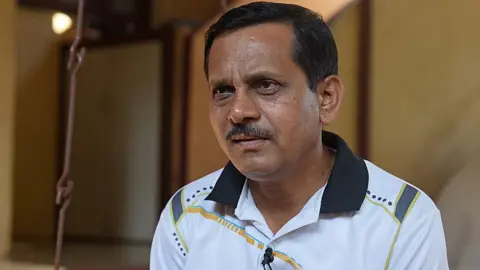
“I have a daughter. I want her to achieve things in life, and to live the best life that can be something.” “Why can’t girls play Kabadi and take out a profession from him?”
So he and his colleagues, who played Kabadi when they were younger, believed to be good to teach local girls how to play. Their savings – 5,000 rupees ($ 60; 50 pounds sterling) – were persuaded to allow them to use their reasons, and opened what they believed to be the first Kabadi girls in the region.
Initially, only two girls, who were school students, joined. “Parents were not ready to allow their daughters to play Kabadi because this means spending a lot of time away from home,” he says. “They are also concerned about the impact they may have on the prospects for their daughter’s marriage,” as traditional families will not agree to girls to go out and return home late.
Dagi and his colleagues went from a door to a door that reassures the parents that their daughters will be safe playing Kabadi in and after school training sessions. I reassured them that they would properly supervise the girls and do not claim to spend it by boys.

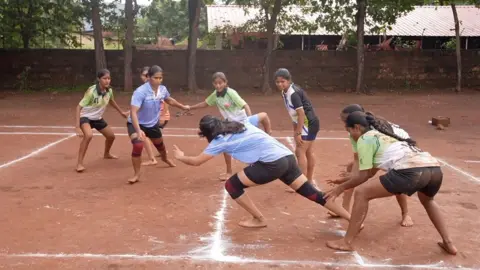
Initially, the teachers were picking up girls from their homes and dropping them, but as numbers grow, they could no longer do so. Now, there are about 30 girls in the club and are estimated that about 300 girls have trained with them since they started training, including Diji’s daughter. Some start playing at the age of seven.
Like the rest of the club members, Mina is training for two hours before school and two hours after the semesters ended. She must leave the house at dawn and not even return to darkness.
“I go alone and it is dark [in the morning]. I used to fear that someone would do something for me. My family was not supportive at that time, and she is still not satisfied with my choice to become a sports column. “
But it is persistent, inspired by the members of the club who have excelled over the years and joined the state teams or local championships. Sidhi Chalk and Samine Bouranskar were among the first group of girls who trained in the club for eight years. Now, at the age of 25, they are professional league players and financial independents.
Initially, their families believed that Kabadi’s play was a stage that would pass, and when the woman decided to make the profession, their parents were not happy. There is still pressure for them to marry, but at the same time their families are also proud that women are in good condition.

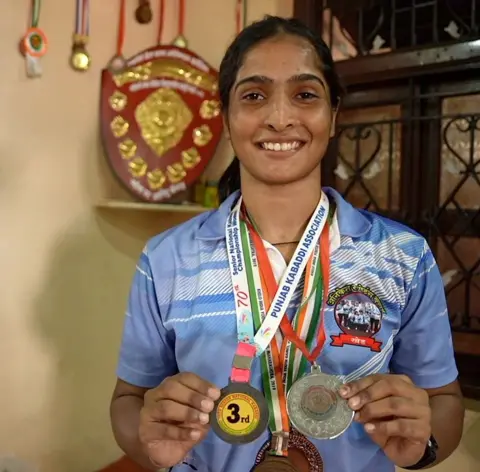
“No one in my family earns as much as I do,” said Samerin. “I now live in a big city and take my own choices. It is coming from my community, it is difficult for girls to follow what they want. I am only here because of Kabaddi,” she says.
Siddhi plays on the same team as Samreen – their friendship was born outside Kabaddi. They have traveled throughout India for competitions, medals and championships. “I can only do that because of my cabin. Otherwise, I was married and I ended up in my husband’s place washing the dishes,” said Sidhi and laughing, and they seemed to have escaped from this fate.
Excellence in sport in India can also help players to obtain jobs in the public sector. Indian states allocate jobs for high achievements in sports, ensuring income even after the player’s active years have ended.
Many rural girls take sport with the dream of getting financial independence through these jobs. It can also help them get greater respect and a feeling of identity.
“When we started the sports club, no one has given any importance to these girls. They were always secondary citizens in their homes, in society,” says Velas Bindand, a young coach at the club.
“But we realized that when rural girls climbed in their lives through sport, their lives change greatly. The way they speak, the way they carry themselves, and their lifestyle, everything changes.”

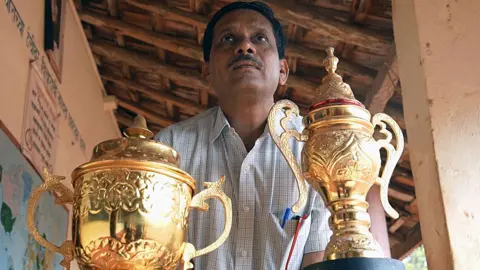
Even if they did not become a professional athlete, many members of the club have seen their confidence and persuaded their families to allow them to leave to the university and delay the marriage until they grow up.
Society is also more acceptable, and when they see girls exercise, people no longer worship them anymore.
The club is funded by the coaches, and the cash prizes that the team wins in the accidental competitions and donations. Most girls are poor and unprecedented families and have no subscription fees.
In addition to the term training, the club organizes and funds residential sports camps in the school in the summer, and provides food such as eggs, bananas and milk, and often pays to treat players’ injuries.
Over time, parents’ concerns have been reduced, but critics are sometimes wondering about the motives of the coaches. “People say things indirectly,” says Di. Why don’t you train children? “But he says that there are already opportunities for boys, and there is a gap when it comes to girls.
“We are not only trainers,” Villas added. “Sometimes we are their parents, direct them, destroy them, and help them make the right choice.”
And Meena knows the potential of this precious opportunity: “I want to be the best Raider and become the captain of the Indian Kabaddi team,” she says, and she dares to dream about medals and championships and left the life of a regular village girl behind.
https://ichef.bbci.co.uk/news/1024/branded_news/4c95/live/9d4550f0-d7db-11ef-87df-d575b9a434a4.jpg
2025-01-28 00:06:00







